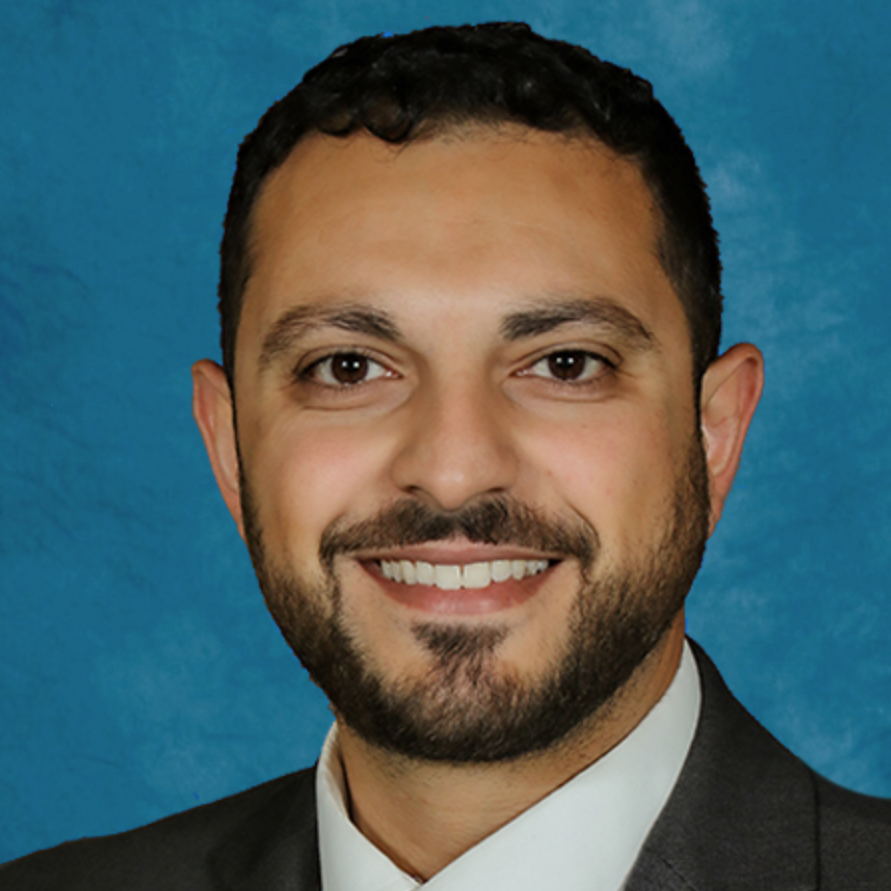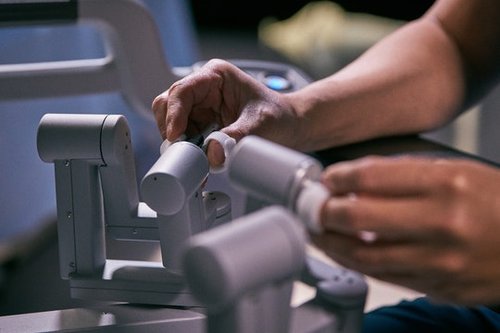

Mina Saeed
Surgeon
800 Austin St East Tower, Ste. 563 Evanston IL, 60202About
Dr. Mina Saeed is a board certified, and fellowship trained bariatric and general surgeon, practicing in Evanston, IL. He is currently accepting new bariatric and general surgery patients, at AMITA-St. Francis Hospital. Dr. Saeed specializes in minimally invasive surgery, such as robotic surgery, and other advanced laparoscopic and endoscopic techniques.
His passion is weight-loss surgery. As a bariatric patient himself, he intimately understands the broad impact obesity has on the quality of one's life. Through his success with bariatric surgery, he is driven to help others achieve their health and weight-loss goals.
To make an appointment, please visit www.surg-associates.com or call 847-869-0522. For direct questions, you can reach out to him through the "Patient Questions" portal. Facebook and Instragram sites are currently under development.
Mina Saeed's Videos
Education and Training
Rush Medical College MD 2013
Board Certification
American Board of Surgery
Provider Details

Mina Saeed's Expert Contributions
Do you go home the same day after gallbladder removal?
In the vast majority of cases, yes. Unless you have several other significant medical issues, or were already admitted to the hospital. READ MORE
How long does it take for the incisions to heal after gallbladder surgery?
The incisions continue to heal until the 5th or 6th week. The scars, however, can continue to diminish long after that. READ MORE
Do you get put to sleep for hemorrhoid surgery?
If you are having a procedure in the operating room, particularly removal of a hemorrhoid, then chances are you are going to sleep. The only in-office procedure is banding for internal hemorrhoids, but this is not indicated for external hemorrhoids. READ MORE
What can you not do after prolapse surgery?
You should avoid straining. Your stool should be softened, and plenty of fiber and water to prevent straining. READ MORE
How long is hospital stay after colorectal surgery?
This all depends on the technique used and the section of colon being removed. At minimum 2 nights, but typical is 3-4 nights. READ MORE
Does gallbladder surgery require a hospital stay?
The vast majority of gallbladder surgery is done as an outpatient, meaning you do not need to stay in the hospital for recovery. This is ofcourse up to the discretion of your surgeon. READ MORE
Can I eat normal food after gallbladder surgery?
I would recommend avoiding greasy and fried foods. The gallbladder contained concentrated bile, made for digesting fats. The bile is made in the liver, however, and after removal of the gallbladder, it will take over, and provide your intestine with all the bile it needs to digest fats. This takes time, however, usually 3-6 weeks. In that time, eating greasy, fatty or fried foods may induce diarrhea. READ MORE
Is gastroscopy done with anesthesia?
It is done under conscious sedation, meaning you will be sedated, but not under general anesthesia. READ MORE
How long can you wait to have hernia surgery?
This really depends on the size, location, and symptoms you are having. Smaller hernias, between 2-3 cm, are the most likely to cause a problem. Very small hernias, less than 2 cm, or large hernias, greater than 5 cm are unlikely to cause intestinal obstruction or strangulation. Inguinal hernias are equally unlikely to cause these problems, with an average risk of about 1% per year. READ MORE
What happens if you don't fix a stomach hernia?
If you are referring to a hiatal hernia, in which the stomach is pulled into the chest, then it may lead to long-term acid reflux, troubles swallowing, and in worst case scenario, twisting and blockage of the stomach. READ MORE
How do you clear your lungs after anesthesia?
Deep breathing, coughing, walking, and spending little time lying down. READ MORE
What surgery is done for bowel obstruction?
If you have had previous surgery, then you are at risk for developing a bowel obstruction at some point in your life, it may be 30+ years after the initial operation. If you've had an obstruction, and are not in life threatening danger (i.e. there is no bowel compromise) then a nasogastric tube is placed and the bowel is decompressed for 24-48 hrs. If there is no passage of gas from your bottom, and/or your symptoms worsen, you need surgery to cut the scar tissue and free the intestines. This can also be done when you are recovered completely, as an elective procedure. The caveat is that any surgery will then produce further scar tissue, so there is no guarantee this doesn't recur, unfortunately. READ MORE
Is general anesthesia used for an appendectomy?
Yes READ MORE
Are you asleep during a rectal exam?
If your doctor is doing the exam in the operating room, you will likely be asleep. READ MORE
Is general anesthesia used during thyroid surgery?
Absolutely READ MORE
Are there any food restrictions after general anesthesia?
Most physicians would recommend a light meal as anesthesia tends to induce nausea. Nothing too salty, greasy, fried, etc READ MORE
Is anesthesia safe for elderly?
In general, anesthesia is safe for the elderly, but it depends on their medical problems. If they have serious heart or lung problems, there is an increased risk that must be weighed against the benefits. A healthy, active, independent elderly person incurs little more than average risk from general anesthesia. READ MORE
Diarrhea from surgery?
First, I would recommend a small bowel follow-through study, where you drink contrast, and xrays are taken. The reason being, if there is still a fistula, that could be source of persistent entero-colonic fistula. Typically, unless >50% of the colon is removed, patient's should not be experiencing long-term severe diarrhea. READ MORE
How do you know if a hernia needs surgery?
Great question. In my opinion, inguinal hernias should be diagnosed if 1) they cause pain, 2) they cause intestinal obstruction, 3) they are unsightly to you, and/or it causes anxiety/insecurity. If the answer is yes to any of the above, it should be repaired. The chance of bowel becoming entrapped within it is 1-2%, but can be a life-threatening emergency if it occurs. READ MORE
Laparoscopy for endometriosis diagnosis?
Hello, I have no experience with endometriosis, as that is typically treated by a Gynecologist. I wouldn't be able to give you an accurate time, unfortunately, but I wish you the best of luck and a speedy recovery. READ MORE
Areas of expertise and specialization
Faculty Titles & Positions
- Medical Director-Trauma Services AMITA-St Francis Hospital 2021 - Present
- Clinical Assistant Professor of Surgery University of Illinois-Chicago 2021 - Present
Professional Memberships
- ASMBS
Fellowships
- Scripps Clinic-San Diego Advanced Minimally Invasive and Bariatric Surgery
Fellowships
- Scripps Clinic-San Diego0Advanced Minimally Invasive and Bariatric Surgery
Professional Society Memberships
- American Society for Metabolic and Bariatric Surgery, and the Society of American Gastrointestinal and Endoscopic Surgeons. He is also certified in Basic Life Support, Advanced Cardiac Life Support, and Advanced Trauma Life Support
Mina Saeed's Practice location
Mina Saeed's reviews
Write ReviewMedia Releases
Get to know Bariatric Surgeon, Dr. Mina Saeed, who serves patients in Evanston, Chicago, and surrounding suburbs in Illinois.
A board-certified and fellowship-trained bariatric surgeon, Dr. Saeed is affiliated with Surgical Associates, SC, serving as the Medical Director of Trauma Surgery at AMITA St. Francis Hospital-Evanston.
Established in the 1960s, the board-certified physicians of Surgical Associates, SC in Evanston, Illinois have built a reputation for surgical excellence. They are proud to offer patients the most comprehensive general surgical services with state-of-the-art equipment at AMITA St. Francis Hospital. Their capable physicians provide a full spectrum of operative procedures encompassing a broad array of surgical disease states.
Throughout his academic career, Dr. Saeed received his Bachelor of Science degree in Biology from the University of Wisconsin-Milwaukee, and earned his medical degree from the Rush Medical College. He then went on to complete his residency in General Surgery at the University of Illinois at Chicago-Metropolitan Group Hospitals, and his fellowship in Advanced Minimally Invasive and Bariatric Surgery at Scripps Clinic-San Diego.
Distinguished as a Fellow of the American College of Surgeons (FACS), this doctor is board-certified in bariatric surgery, trauma surgery and general surgery by the American Board of Surgery (ABS).
In order to remain up to date in his field, he is an active member of the American Society for Metabolic and Bariatric Surgery, and the Society of American Gastrointestinal and Endoscopic Surgeons. He is also certified in robotic surgery, and has completed over 50 advanced robotic procedures. Through the use of this type of minimally invasive surgery, patients are afforded shorter recovery times and hospital stays, and a quicker return to their life.
Active in academia, Dr. Saeed serves as an Assistant Clinical Professor at the University of Illinois at Chicago College of Medicine, and at the University of California-Riverside School of Medicine.
His passion for bariatric surgery stems from his own experience as a bariatric patient. Having successfully lost weight after bariatric surgery, he gained an unmatched dedication to weight-loss surgery, and obesity as a disease. As a part of a comprehensive weight-loss center, we have a registered dietician, psychologist, and medical weight-loss specialist, to help you patients along their weight-loss journey.
On a more personal note, he is fluent in both English and Arabic.
Recommended Articles
- Appendicitis During Pregnancy: Signs and Symptoms
Appendicitis During Pregnancy: Signs and SymptomsAppendicitis is a condition which occurs in about 1 in 1000 pregnancies. While it is most common during first 2 trimesters, it can occur in the last trimester too. It’s often hard for the pregnant woman to identify the signs and symptoms of...
- What Are the Treatment Options for Appendicitis?
Appendix FactsThe appendix is also known as acecal appendix and sometimes the vermiform appendix. It is small in size with a finger-shaped pouch attached to the large intestines right at the bottom side of the belly.The lower tip of the appendiz is found 2cm below the ileocecal valve, which...
- What are Cataracts: Get the Facts
Cataract is the blurring of the lens part of the eye that can lead to complications in vision. Aging is the cause of the common form of cataract. It grows slowly and should symptoms develop they should not be ignored as this condition worsens with time. Congenital defects, previous eye surgery,...
- Reasons Why You Need an Adenoidectomy
Having a sore throat is a common condition and anyone can be affected by it. One cause of a sore throat is tonsillitis (inflammation of the tonsils). However, apart from tonsils, there are also adenoids, which are found at the back of the pharynx. Adenoids can also be affected and can cause a series...
- What to Expect After a Cholecystectomy
In case you have problems with your gallbladder and there is a need for it to be removed, you will experience unusual and uncomfortable symptoms while trying to adapt to a new life without a gallbladder. Obviously, when your gallbladder is removed, bile can't be stored like before since it is meant...
- Does Aneurysm Require Surgery?
An aneurysm is the formation of a bulge when the walls of the arteries weaken. It is an artificial condition that can remain undetected for years. If it ruptures, it could lead to many complications and, at times, even death. The following are a few figures concerning the deaths caused by different...
Nearest Hospitals
EVANSTON HOSPITALl
2650 RIDGE AVE EVANSTON IL 60201PRESENCE SAINT FRANCIS HOSPITALl
355 RIDGE AVE EVANSTON IL 60202







